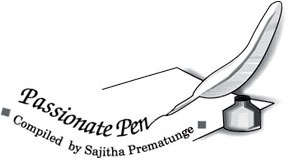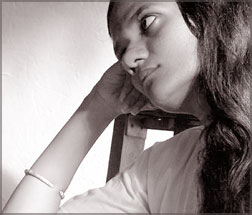
'We lack resources and exposure' - Ruwanthie De Chickera
by Sajitha Prematunge
Ruwanthie De Chickera is a Sri Lankan playwright and director, who've
written many critically acclaimed plays such as Middle of silence and
Two times Two is Two.
Check point yet another magnificient interactive play by her,
introduced Colombo audiences to the concept of 'Forum theatre'. Her
plays have been performed in Colombo, Bangalore, London, Manchester, New
Delhi, Mumbai, Manila, Tokyo, Washington and Australia.
Her first play, Middle of Silence written when she was just 19 years,
reflecting deep insight into human behaviour and relationships, won the
British Council International New Playwriting Award for South Asia in
1997 and the Gratiaen Award for the Best English creative writing in Sri
Lanka in 2000. Two times Two is Two was short-listed for the World
Student Drama Trust Award in 1998. She has also served in the panel of
judges for the Gratiaen Awards in 2005.
Q: What made you seek a different path from earlier
dramatists?
A: That's a judgement you are making. Actually two judgements
- one that I am different from other dramatists, and two - that this
difference was a conscious decision.

The first is really your opinion, so I can't comment on it. With
regards to the second, whether it was a conscious choice on my part to
be 'different', the short answer is 'no'.
The long answer is - when I wrote my first play, I had not read a
single play in my life. I just wrote. I was 19 years. I wrote a play and
(luckily for me) it won an award.
I remember the first script I read, it was a Pinter play, and I read
it at the British High Commission, as I was waiting for my visa to go to
UK to get this playwriting award. The chief judge was Harold Pinter and
I thought it might be a good idea to read one of his plays before I met
him.
That sounds flippant, but the point is, when I started writing, I had
no idea about international dramatists - let alone local ones - so I
never made a conscious decision to be different from anyone.
Q: What do you think about farce and social comedy in Sri
Lankan theatre?
A: I think farce is an excellent form of theatre. Especially
in Sri Lanka, where humour is so much a part of our daily life. I have
found (through my own mistakes) that even the most serious theatre works
will be better if there is a bit of humour in it. So, I believe in
farce.
Q: Are you happy about it, and why?
A: Professionally, what I have to say is, I know what an
effort it takes to produce drama in Sri Lanka, and so I admire all
people involved in drama. Also, if there is an audience for your work,
it is relevant and so, important.
There is enough space for different dramatists to provide different
kinds of entertainment to people - and the more variety there is, the
better for all. My one grouse is that its sometimes easier to get
sponsorship for large productions and comedies, and I wish that more
sponsors would take risks with new dramatists and experimental projects.
Q: What were your concerns in writing plays like Middle of
silence and Two times two is two?
A: None. Everyone kept telling me there would be no audience
for serious theatre, but I have discovered this is completely false. Sri
Lankan audiences are very intelligent and receptive and discerning. I
believe they will respond positively to any kind of theatre if it is
good.
Q: Why have your techniques altered from one play to another?
A: My techniques have changed because I have not stopped
myself from experimenting with style. It could also be that I have not
'found' my particular style of theatre. I don't know. Maybe some people
would like me to develop a certain kind of theatre and improve on it,
but right now, I am not interested in digging my heals in. I am happy to
play around with different styles.
Q: Why did you wish to make the Mirror making factory a
collaborative effort?
A: It grew out of a series of workshops conducted over a year
at 'Sahanaya'. It was a collaborative effort from the start - the
workshops, the script, the production.
Q: To what extent has personal experiences helped you in
producing dramas?
A: My family has had a great impact. I work with my two
brothers - Gihan and Amal de Chickera - and my husband - Shakthi
Ranatunga - on my plays. My parents are always among my first critics. I
have not always sought to produce what I have personally experienced in
life. But of course, it seeps in, in what I notice and what I am
interested in.
Q: What's your special interest in getting handicapped people
involved in dramas?
A: No special interest.
As far as I am concerned, everyone has a story to tell. Some people
have more access to ways of telling their stories, some people have
less, some people, none. I am interested in stories that don't get told
and this has led me to work with different groups of people.
My team at 'Sahanaya' (National Institute for Mental Health) was one
of these groups. Incidently, they are not handicapped people, they are
people who have had experiences of mental illness.
Q: Why do you think social conscience in important for Sri
Lankan theatre?
A: A Social conscience is important for life. Surely theatre
will benefit from it! and definitely, our country, in its present state.
Q: What are your thoughts on the future of Sri Lankan drama?
A: I have two thoughts. Firstly, I think we are in a good
place - as far as talent goes. I have travelled quite a bit, and seen
theatre from different corners of the world. I can say, with a lot of
confidence, that when it comes to raw talent, Sri Lankans compare very
well, excellently, in fact.
What we lack are resources and exposure. Basically, money,
sponsorship and opportunity. If our dramatists were given the
opportunities and facilities that dramatists from other countries get -
even countries like India - they would be top rung.
The second thing that is important for theatre to flourish is the
culture of professional reviewing. Dramatists put a lot of effort into
productions, which die when the curtain closes because the debate is not
carried further into society through reviews, debates, critiques and
articles, or worse, reviews are 'set up' to provide only insanely
fawning responses.
This is very frustrating. However, finally, I think, the Internet is
doing for theatre, what newspapers are failing to do - which is
providing good reviews and honest debates on shows. There are a few
excellent blogs - which provide a very important service in this regard.
This is very exciting and inspiring for dramatists, and will go a long
way to improve the culture of theatre in the country.
[email protected]
|
